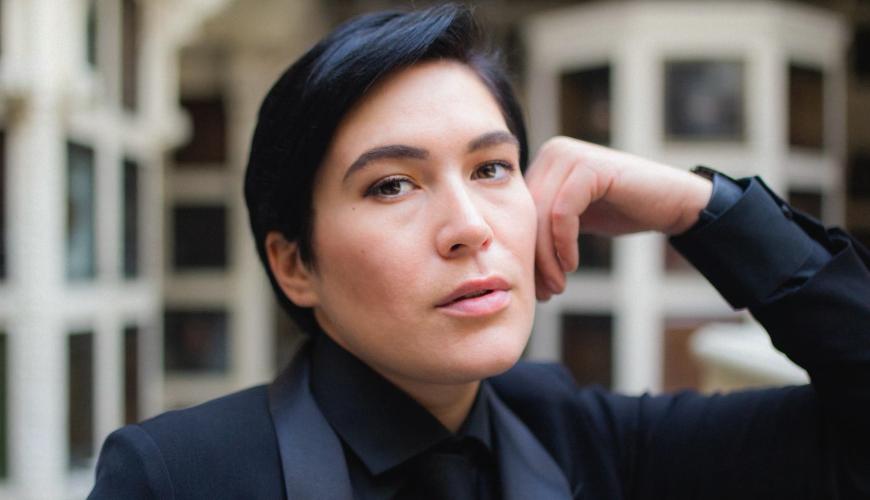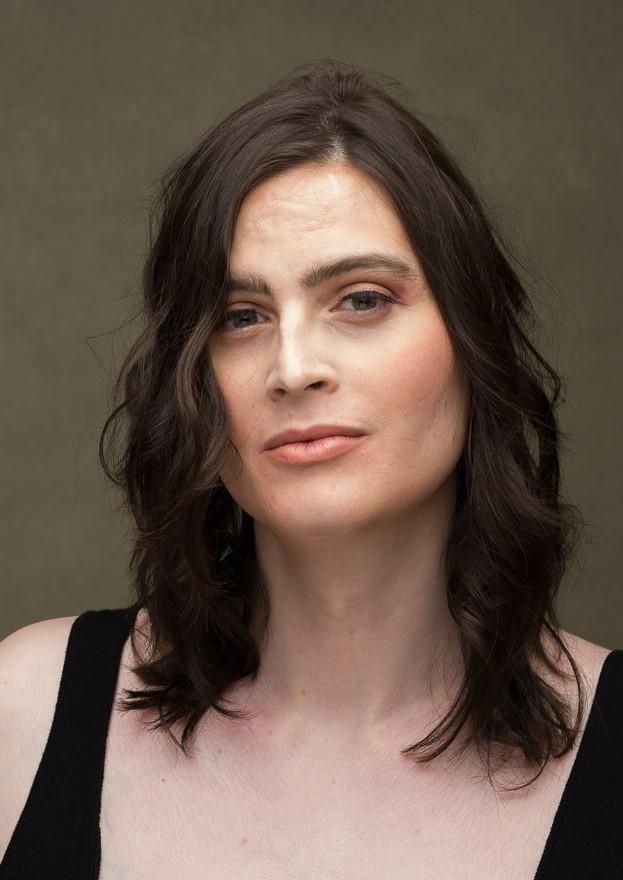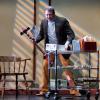
Opera Parallèle and the Transgender District are reprising their “Expansive” concert this week after last year’s sold-out performance. Featuring singer Katherine Goforth, nonbinary singer and aerial artist Nikola Printz, and harpist/multidisciplinary artist Ahya Simone, the two-night event, Aug. 3–4 at the A.C.T. Strand Theater, shows Opera Parallèle deepening its commitment to the queer and trans community of San Francisco. “We are excited because it gives us space to celebrate joy and community,” says the company’s general and artistic director, conductor Nicole Paiement. Performer and activist Afrika America makes a triumphant return as hostess extraordinaire.
The Transgender District’s executive director and co-founder, Aria Sa’id, centered the importance of joy in this concert as well: “With anti-trans legislation and attacks, this year alone has been hard on our transgender community,” she writes. “To host a night that showcases our talent and joy means so much to us, and we hope you all will come and bask in the greatness of our trans existence.”

Paiement conceives of this collaboration with the Transgender District, part of Opera Parallèle’s Bullhorn community program, as one step in the crucial work of developing a “lasting relationship in service” to the local community. As a testament to that work, this year the company has extended “Expansive” from one to two nights and moved it to a larger venue.
For singers Goforth and Printz, the show has been an opportunity to craft programs that are in conversation with their own histories, work which Printz describes as “both a luxury and a little bit of a curse for marginalized performers, who always have to include their identity.” Both artists are still experimenting to find repertoire that fits them. Goforth will be singing “Deh vieni, non tardar” from Mozart’s Le nozze di Figaro, her first public performance of a soprano aria.
Music plays an important role in self-making. In a 2021 article in Them magazine, harpist Simone talked about how the elegance and femininity of the instrument drew her to it as a means of embodying the woman she wanted to be, describing the harp as “an outlet for my teenage gender dysphoric carry.” Simone’s wide-ranging work embraces the world of R&B and jazz, from projects like her 2020 single “Frostbite” to her film Femme Queen Chronicles, in addition to classical pedal harp repertoire, like the Claude Debussy and Henriette Renié pieces she will be playing this week.
Simone will also be performing arrangements of “Toxi-Lied” and “Sonnenscheinchen” by Marie Nejar (or Leila Negra, her stage name), a German woman of African descent, born in 1930, whose life and career were heavily molded by the rise of the Nazi regime. Simone, invited to collaborate with visual artist James Gregory Atkinson on his work examining the lack of Afro-German narratives, will open a musical conversation with this woman whose fraught career started as a child in propaganda films and ended, by her own choice, in her early 20s, after making 30 records.

Goforth says that although this concert is still only a small part of Opera Parallèle’s productions, she feels safe and supported curating and developing her musical selections. “The ability for artists to have self-determination with the work that they do is the most important thing,” she says. “Because I’m not interested, really, in a narrative about integration into dominant systems. I’m interested in how those dominant systems are changing and no longer being systems that dominate.”
Her selections for “Expansive” — Mozart, Schubert, Wagner, even folk-song settings — are deeply personal and thought out. Wagner’s Wesendonck Lieder, for example, were written for “female voice,” without further specification of range. While Goforth enjoys performing this work because it fits her voice well, “it’s also about claiming that space of what it means to have a female voice.”
Printz, who uses they/them pronouns, has also chosen works that fill out the range of their identity and reflect “the fluidity of my gender as it kind of navigates through feminine and masculine and neutral on a daily basis.” David Lang’s “I was a woman,” from prisoner of the state, hits the nail squarely on the head, but other selections are more playful, like the irresistible “Lush Life” by the queer Black composer Billy Strayhorn. “You think of some old queen in a bar, smoking a cigarette and drinking an olive martini,” says Printz about the song. “[But Strayhorn was] a 16-year-old queer kid. And that makes it all that much more endearing to me.”
And of course, Printz’s love of drama extends to the practice they’ve developed of singing while performing as an aerial artist. This week, they are pairing Richard Strauss’s “Morgen!” with a swiveling trapeze act. The text of the song, a poem by the queer anarchist writer John Henry Mackay, is about a lover’s anticipation. In Printz’s interpretation, the deadly cost of queer love for the poet at the time and place of writing “Morgen!” — Germany in the late 19th century — imbues the piece with tragic, dangerous hope that resonates with the suspense of aerial performance.

The future of this initiative is exciting. Paiement and Opera Parallèle want to move to centering trans and nonbinary artists by commissioning new operas or — in a more gradual and maybe more lasting evolution — working on casting trans singers in existing operas. With binary gender so deeply baked into the characters and stories of the opera canon, it will be no small feat to peel away the layers of tradition to find openings for new thought and new interpretations.
But there is money, time, and labor tied to all the details. In Goforth’s words, fundamentally we need to be asking, “What does it look like to have a world where we’re not prioritizing audiences based on their social power? And where we have figured out a way to have money to produce works without needing to cater to the most dominating people?”




